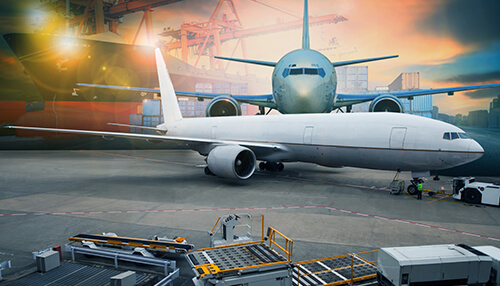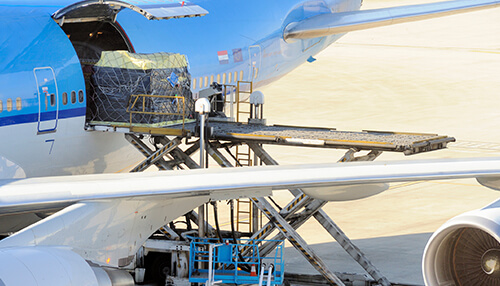Parcel delivery by air freight can be done via either a charter or a commercial airline. These packages leave from major hubs for commercial and passenger air travel and head to any location where a plane can take off and land. The term “air freight” refers to the rapid conveyance of commodities through aircraft. Despite being the quickest route to move products globally, air freight has always had a high cost per unit of weight.
At the turn of the twentieth century, air freight joined the ranks of maritime, rail, and land commerce as an important component of international trade. Air freight’s prominence as a shipping method, both domestically and globally, has skyrocketed in the previous 40 years due to the proliferation of trade networks and marketplaces.
Advantages of Air Freight Shipping
Air freight shipping has several advantages over other types of shipping. These benefits are:
Fastest Mode of Transport
Time is a major factor in transport and for certain goods, there can be no negotiating with time. For perishables such as food, there is a certain time threshold beyond which they can no longer be economically viable and for air transport is the only mode of transportation that can assure businesses that their good will arrive on time.
Reliable
Air transportation is the most reliable means of transport. You can expect departure time and arrival time to be standard and predictable unlike shipping via sea, road or rail where many factors will affect delivery. Unless there is severe weather, the timing of air transport is assured, and even in the case of delays, transporters have warehouses where goods can remain until there is a window for transport. You can expect your goods to always arrive when they are expected to arrive.
Secure
With threats such as thefts, banditry and piracy, affecting sea shipping and road transportation, traders have opted for air freight to increase the security of their goods. Some goods are really valuable and therefore they require utmost security and the only means of transportation that can assure this security is air transport. The plane leaves a very secure airport, and stay in the air, before landing in another secure airport. There is no security lapse in between where goods are likely to b hijacked. Furthermore, the plane manifest showing the type of goods being transported is a highly guarded and confidential document unlike road or rail transport where identity of goods can be easily leaked.
Less need for Warehousing
Air freight requires very little clearance time and therefore transporters don’t require any warehousing at the airports or nearby. Once the goods are ready at their point of manufacture or storage, they are simply taken to the airport where they can be cleared upon arrival and loaded onto the next available flight. This ease reduces the overall costs of exports or importations and therefore businesses end up making more profits especially if they handle larger volumes of goods.
Low Insurance Premiums
The low risk of theft and the fact that air transportation takes very short periods of time, ensures that the overall risk on the goods is lower. This in essence reduces the overall insurance premiums paid on the goods and this is a good thing for businesses. Unlike sea shipping where insurance premiums have to be higher due to the length of time in transit and the heightened insecurity, air freight attracts very low premiums irrespective of the goods being transported.
Types of Air Cargo
There are generally two types of air cargo and these are general cargo and special cargo. General cargo is basically all other types of cargo of high value such as jewellery or electronics. If you order for a phone or laptop and you require it immediately, then air freight is the most convenient way it can reach to you especially if you are ordering it from abroad. The costs of air freight may be higher but due to the value of margins you’ll make from the sale or the cost benefit of receiving the goods earlier on time, makes air freight the best option.
Special cargo are types of cargo that require specialized handling or protected casing. In some cases, the entire airplane could be repurposed for specialized cargo such as military vehicles, or even certain chemicals. The nature of specialized cargo may require temperature control or chemical sanitization during freight and that’s why man special cargo charter entire planes irrespective of the cost.
Not all cargo can be transported via air freight and this may be due to international convention or security. Certain biochemical products, firearms and explosives cannot be transported via air freight because the changing air pressure may activate them and this may injure the flight crew and people on the ground. The UN has also classified certain dangerous goods which cannot be transported via air. Generally, anything that is explosive or flammable cannot be transported via air freight and this can include normal things like Lithium batteries, aerosols, and even power banks.
The Future of Air Freight
There will likely be a temporary slowdown in air freight growth as a result of increasing fuel prices. While air freight volumes are expected to rise over the long term, they will be more effectively balanced by the incorporation of air freight into multimodal supply chains.
New markets may be entered with the help of air freight because of the speed and reliability with which initial shipments of product can be made. Delivery of vital replacement parts and high-value inputs, as well as the exchange of samples, will continue to rely on air freight. At last, air freight will play an increasingly vital role in facilitating reverse logistics, which includes warranty and repair work for electronics and other high-end consumer items.
In conclusion, air freight will continue to be a major part of global logistics and with constant improvements there will likely be more variety of goods that will be transported via air.



